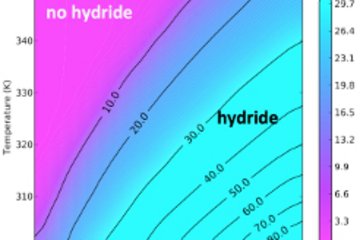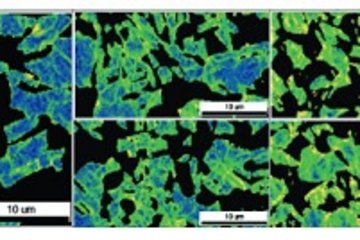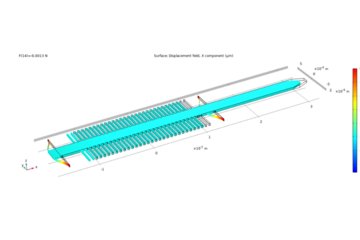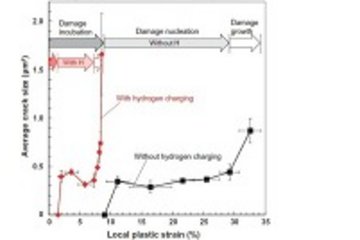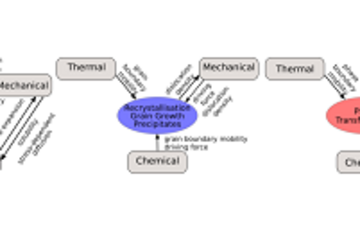All genres
521.
Talk
Wasserstoffversprödung – Mechanismen verstehen und verhindern. ThyssenKrupp Steel, Center of Materials Excellence, Duisburg, Germany (2006)
522.
Talk
Wasserstoffversprödung – Mechanismen verstehen und verhindern. ThyssenKrupp Steel, Center of Materials Excellence, Duisburg, Germany (2006)
523.
Talk
Ab initio description of Iron and Steel - The department of computational materials design -. Visit of ISIT at MPIE, MPIE, Düsseldorf (2006)
524.
Talk
Ab initio Simulation von Grenzflächen. Arbeitstreffen der Helmholtz-Allianz „Werkstoffübergänge“, Geesthacht (2006)
525.
Talk
Ferromagnetic shape memory alloys: Thermodynamic and magnetic properites. Joint group meeting at Material Research Laboratory of University of California, Santa Barbara, Santa Barbara, USA (2006)
526.
Talk
Temperature and magnetic field dependent properites of Ni2MnGa. Kolloquium zur Festkörpertheorie, Institut für Physik der Humboldt-Universtität zu Berlin, Berlin, Germany (2006)
527.
Talk
Temperature and magnetic field dependent properites of Ni2MnGa. DPG Spring Meeting of the Division Condensed Matter, Dresden, Germany (2006)
528.
Talk
Temperature dependent properites of Shape-memory alloys. Physics Seminar of Loughborough University, Loughborough, UK (2006)
529.
Talk
Determination of Thermodynamic Quantities from Ab Initio Methods. WTL Learnshop, Aachen, Germany (2005)
530.
Talk
Temperature-dependent ab initio investigation of the martensitic phase transition in magnetic SMAs. Kickoff-Workshop of SPP1239, Dresden, Germany (2005)
531.
Poster
Intrinsic Heat Treatment in Al–Sc Alloys During Laser Metal Deposition - Driving Factors, Kinetics and Effect of Impurities. Alloys for Additive Manufacturing Symposium 2019 (AAMS2019), Chalmers University of Technology, Gothenburg, Sweden (2019)
532.
Poster
Relative stability of stacking faults in Fe–Nb alloys in comparison with the convex hull for bulk phases. CALPHAD XLVIII, Singapore, Singapore (2019)
533.
Poster
Towards ab initio phase diagram of Fe–Nb: Importance of Magnon-Phonon coupling. DPG-Frühjahrstagung 2018, Berlin, Germany (2018)
534.
Poster
Impact of magnetism on the stability of Laves phases in Fe–Nb alloys. DPG-Frühjahrstagung 2017, Dresden, Germany (2017)
535.
Poster
Investigation of point defects in Heusler alloys: An ab initio study. Bunsen Colloquium at Institute of Physical Chemistry, RWTH Aachen University, Aachen, Germany (2016)
536.
Poster
Towards a microscopic understanding of lattice vibrations in disordered systems: implications for high entropy alloys. International Workshop on Ab initio Description of Iron and Steel: Mechanical Properties (ADIS 2016), Ringberg Castle, Tegernsee, Germany (2016)
537.
Poster
Interaction of magnetic and lattice degrees of freedom. International Workshop on Ab initio Description of Iron and Steel: Mechanical Properties (ADIS 2016), Ringberg Castle, Tegernsee, Germany (2016)
538.
Poster
Off-stoichiometric composition of κ carbide in Fe–Mn–Al–C steels: An ab-initio study combined with experiment. ADIS 2016 Workshop, Tegernsee, Germany (2016)
539.
Poster
Thermodynamic properties of the quaternary Q phase in Al–Cu–Mg–Si: A combined ab-initio, phonon and compound energy formalism approach. The Materials Chain: From Discovery to Production, International Conference, Bochum, Germany (2016)
540.
Poster
The origin of anharmonicity in fcc solids. PSI-K Meeting 2015, San Sebastián, Spain (2015)




